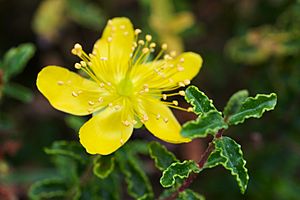Hypericum balearicum facts for kids
Quick facts for kids Hypericum balearicum |
|
|---|---|
 |
|
| Hypericum balearicum | |
| Scientific classification |
|
| Kingdom: | Plantae |
| Clade: | Tracheophytes |
| Clade: | Angiosperms |
| Clade: | Eudicots |
| Clade: | Rosids |
| Order: | Malpighiales |
| Family: | Hypericaceae |
| Genus: | Hypericum |
| Section: | Hypericum sect. Psorophytum (Spach) Nyman |
| Species: |
H. balearicum
|
| Binomial name | |
| Hypericum balearicum |
|
| Script error: The function "autoWithCaption" does not exist. | |
Script error: No such module "Check for conflicting parameters".
The Balearic St. John's Wort (scientific name: Hypericum balearicum) is a special kind of flowering plant. It belongs to the Hypericaceae family. This plant is originally from the Balearic Islands in Spain. It's the only plant in its group called Psorophytum.
Contents
What it Looks Like
Hypericum balearicum is usually a shrub or a small tree. It can grow to be about 0.6 to 2 meters (2 to 6.5 feet) tall. It often forms a round, bushy shape. Its branches grow straight up or slightly outwards.
Stems and Leaves
The stems of this plant are quite unique. They have small bumps, like warts, and tiny glands. When the stems are young, they are yellow-green. As they get older, they turn a reddish-brown color.
The leaves grow directly on the stem without a stalk. They can be up to 15 millimeters (about 0.6 inches) long and 7 millimeters (about 0.3 inches) wide. The tips of the leaves are rounded, and their edges are wavy. They feel leathery and also have noticeable warty bumps. The underside of the leaves is usually lighter in color.
Flowers
The flowers of the Balearic St. John's Wort are very pretty. They are about 15 to 40 millimeters (0.6 to 1.6 inches) wide. Each flower has five petals that are usually a bright golden yellow. Sometimes, they can be a pale yellow.
The petals are shaped like long ovals with rounded tips. They are about 10 to 20 millimeters (0.4 to 0.8 inches) long and 4 to 9 millimeters (0.16 to 0.35 inches) wide. The flowers also have rounded sepals and special leaf-like parts called bracts that look like an involucre.
Special Features
What makes Hypericum balearicum stand out from other Hypericum plants? It's those warty stems and leaves! Also, its unique involucre-like bracts around the flowers help to identify it.
Where it Grows
The Balearic St. John's Wort is found only in the Balearic Islands. These islands include Mallorca, Menorca, Ibiza, Cabrera, and Dragonera.
It is quite common on the island of Mallorca. However, it is much rarer on the other islands. This plant has also been brought to Italy by people.
Habitat
You can find this plant growing in dry woods. It also likes rocky areas that have calcareous soil, which means the soil contains a lot of calcium carbonate. It grows at different heights, from about 30 meters (100 feet) up to 1200 meters (3,900 feet) above sea level.
See also
 In Spanish: Hipérico de las Baleares para niños
In Spanish: Hipérico de las Baleares para niños
 | Aaron Henry |
 | T. R. M. Howard |
 | Jesse Jackson |

